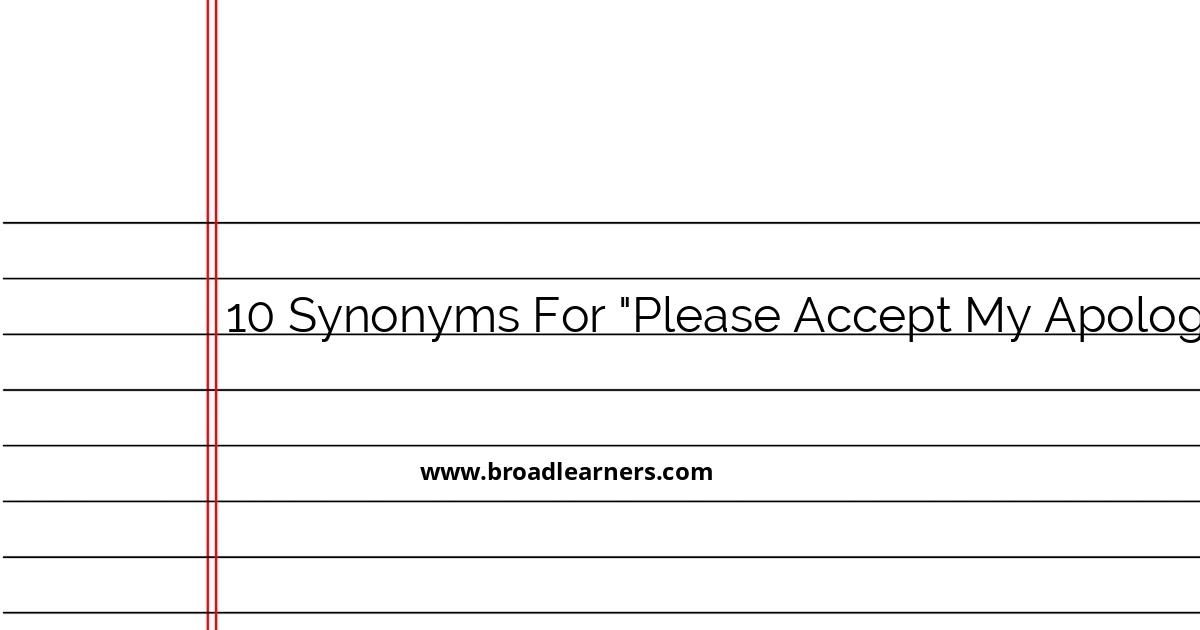In both personal and professional settings, acknowledging mistakes and apologizing with grace is crucial. While 'Please accept my apologies' is a widely used expression, there are numerous other ways to convey sincerity in an apology. Here, we'll explore 10 polite synonyms and offer detailed explanations with examples for each.
- I'm sorry for the inconvenience.
- I apologize for my mistake.
- Forgive me for the oversight.
- I regret any trouble caused.
- Pardon me for the error.
- I beg your pardon.
- I'm truly sorry for any confusion.
- I sincerely apologize.
- I hope you can forgive me.
- I deeply regret the situation.
Now let's delve in-depth into each alternative expression:
1. I'm sorry for the inconvenience
This expression is commonly used in both personal and professional environments to express regret for any disruption or inconvenience caused by one’s actions or decisions.
Example:
Dear Jane,
I'm sorry for the inconvenience caused by the meeting rescheduling. I appreciate your understanding and flexibility.
Best regards,
Alex
2. I apologize for my mistake
A straightforward and honest way to accept responsibility for an error. It communicates sincerity and acknowledgment of the mistake made.
Example:
Hello Michael,
I apologize for my mistake in the report. I've corrected the error and sent the updated version. Thank you for your patience.
Best wishes,
Emily
3. Forgive me for the oversight
An expression that admits a lapse or a failure to notice something. It's a courteous way to ask for forgiveness for missing an important detail.
Example:
Dear Tom,
Forgive me for the oversight on the project timeline. I have addressed it with the team, and we are on track now.
Kind regards,
Sophia
4. I regret any trouble caused
This expression demonstrates regret and awareness about the potential impact of one's actions on others, portraying a sense of empathy and responsibility.
Example:
Hi Sarah,
I regret any trouble caused by the shipping delay. I assure you that we are working to resolve the issue swiftly.
Sincerely,
Ryan
5. Pardon me for the error
A more traditional and formal way to ask for forgiveness for a mistake, often used in written communication to maintain professionalism.
Example:
Dear Mr. Smith,
Pardon me for the error in the contract draft. It has been amended for your review at your earliest convenience.
Best regards,
Hannah
6. I beg your pardon
A polite and somewhat old-fashioned way to apologize, often used when interrupting or needing correction for something said or done without intent.
Example:
Excuse me, Maya,
I beg your pardon for interrupting your speech earlier. It was not my intention to disrupt your presentation.
Apologetically,
James
7. I'm truly sorry for any confusion
This apology is used when previous information may have led to misunderstandings, acknowledging the speaker's role in any resulting confusion.
Example:
Dear Team,
I'm truly sorry for any confusion caused by my prior email. Please refer to this message for the correct details.
Thank you,
Olivia
8. I sincerely apologize
This phrase communicates a deep level of sincerity and an earnest wish to make amends for any offenses or wrongdoings. It is both formal and genuine.
Example:
Hi David,
I sincerely apologize for missing yesterday’s deadline. I am committed to ensuring it doesn't happen again.
Warmly,
Laura
9. I hope you can forgive me
This expression shows vulnerability and the hope for reconciliation. It is a humble way to seek the other person’s forgiveness.
Example:
Dear Alice,
I hope you can forgive me for my tardiness. I value your time and assure you it was an unusual occurrence.
Sincerely,
Mark
10. I deeply regret the situation
This phrase conveys a profound sense of remorse about a specific situation, highlighting the speaker's depth of regret and compulsion to address the issue.
Example:
Hello Rachel,
I deeply regret the situation that occurred during the meeting. Let's schedule a time to discuss how we can move forward positively.
Best,
Daniel
Each of these alternatives for 'Please accept my apologies' is adaptable to different contexts, allowing for both sincere and formal expressions of regret. Using these variations can better convey sincerity and professionalism in effectively resolving conflicts and demonstrating accountability.

Did I miss anything? Respond below